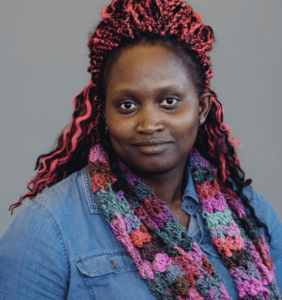
Hawa Dumbuya-Sesay, Executive Director, YWCA NWT
Last summer, catastrophic wildfires forced thousands to evacuate the Northwest Territories.
“It was chaotic. There wasn’t a lot of planning and organizations like ours had to figure out how to support vulnerable populations,” says Hawa Dumbuya-Sesay, Executive Director of the YWCA Northwest Territories.
“Women staying in Lynn’s Place, our second-stage housing, had to evacuate the area, too. They had to worry about things like getting food, paying rent on time, and staying safe,” Hawa says. “The evacuation created a whole other level of anxiety.”
Lynn’s Place is the only second-stage women’s housing in the Northwest Territories. It offers up to three years of low-cost housing to women who have left abusive situations, as well as services like in-house support for the clients, programming geared towards mental wellness, employment readiness, and help to get income support and establish a good rental history. Thanks to your generosity, the Canadian Women’s Foundation supports the work of Lynn’s Place to help women rebuild their lives.
That support is becoming even more critical as Canada experiences increasingly frequent heat waves, wildfires, floods and other climate events. The Arctic is warming at four times the global rate, and environmental events raise the risk of gender-based violence. Community organizations have to go above and beyond to support their communities through such extraordinary polycrisis circumstances and provide essential, life-saving services.
During the wildfires, Hawa and her staff worked to support Lynn’s Place residents who went to Edmonton and Calgary, along with other YWCA NWT clients in our other housing and shelter program. Evacuees and their children faced challenges like long waits for hotel rooms, and many either did not have cars or could not afford gas to get food or supplies in Alberta. Hawa successfully advocated for hotel meal vouchers to help cut costs, and worked with her team daily to help residents meet basic needs throughout the three-week evacuation.
Once they returned home to a landscape of burned-out bushes and thick smoke, it became clear the wildfires would have longer-term physical and mental health impacts. “The fear is that the wildfires are going to come back next summer,” Hawa says. “People aren’t ready for that.”
The feelings of displacement and trauma the community experienced were familiar to what Hawa went through in her childhood. She grew up in Sierra Leone where her own family’s house was burned down by soldiers during the civil war. She and her family experienced homelessness and saw “many things a child should never see” before coming to Canada as a refugee at age 16. What she experienced showed her that women and children are particularly vulnerable in crisis situations no matter where they live. It put her on a path toward becoming a social worker.
Voices like Hawa’s should be front and centre when it comes to addressing Canada’s gender gap in disaster preparedness. Although women and gender-diverse people experience events like wildfires and pandemics in unique ways, research indicates that federal, provincial, and territorial emergency plans lack specific attention to gender analysis. Of 28 plans reviewed, just two refer to “gender” and five mention “women.” Only two refer to domestic violence. All but three refer to social vulnerability.
Even when women are briefly considered in these plans, it’s often as a homogenous population. Policy-makers aren’t thinking about survivors of gender-based violence or women in shelters. As climate events increase in frequency and severity, the Foundation is calling on policy- and decision-makers to prioritize consultations with our grantee partners and women-serving organizations in crisis planning. Your support enables this systems change effort to close the gender gap in emergency preparedness.


